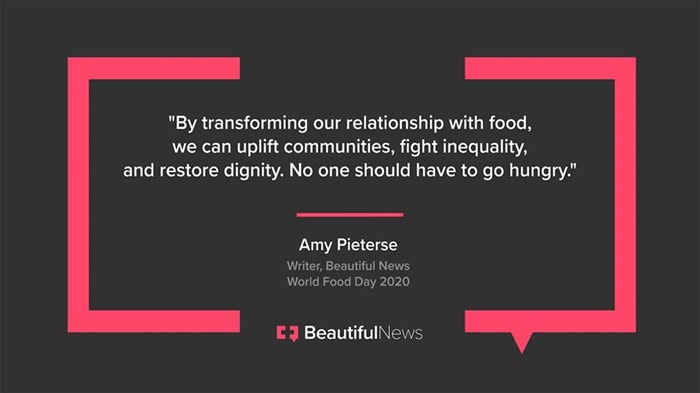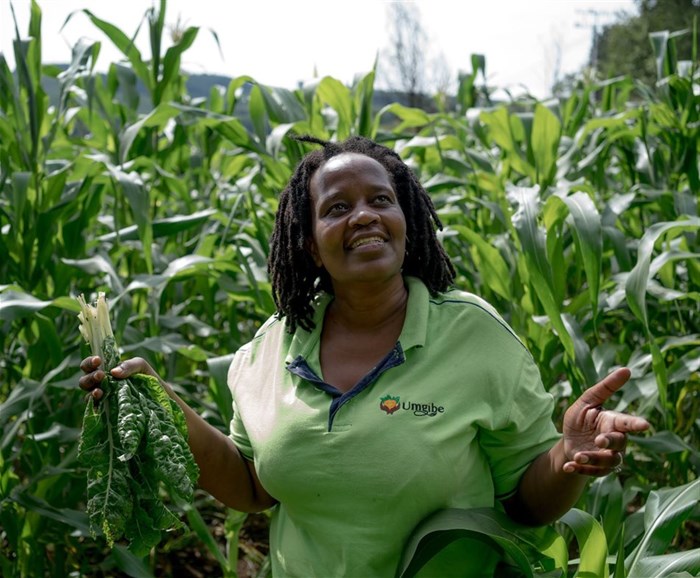
Top stories





Energy & MiningGlencore's Astron Energy gears up with new tanker amidst Sars dispute
Wendell Roelf 8 hours

More news


















Logistics & Transport
Uganda plans new rail link to Tanzania for mineral export boost










When South Africa went into lockdown, fear entered people’s households. But not of Covid-19 – a fear of something far more pervasive. Hunger. Before lockdown, an estimated 13 million people experienced food insecurity. After, that number increased to at least 20 million. People who lost their income were pushed over the edge. Children who depended on school meals suddenly had to go without them. Starvation was a greater threat than the virus – some claimed they would rather get sick than go hungry.
The pandemic punctuated a long-existing disaster. In a country where a third of food goes to waste, millions go to bed with rumbling stomachs. Food chains in cities dominate the sector, leaving people who are in impoverished and rural areas unable to access affordable and nutritious food. Malnutrition erodes dignity, stunts growth, perpetuates injustice and can kill. Hunger in South Africa is an indictment of the inequality that continues to haunt us.
Food is a basic human right, and the foundation of our lives. We cannot think, be, or live without nutrition. While South Africa is technically considered a food secure country, there is a stark difference between those who have access to food, and those who don’t. If you’re reading this, you probably drive to the nearest supermarket, where the food has been pre-prepared, packaged, transported on a truck and marked up. For others, bread and fruit juice is the staple. Meat once a week is a rare luxury. This disparity is an affront to people’s bodies, minds, and humanity.
The unjust divergence in our food system is indicative of another issue – our increasingly disconnected relationship to what we eat. Many of us likely have no clue how to grow our own food. And many of us probably throw out a significant portion of the food we buy. Our habits are destructive and harmful, not only to the environment, but to society as a whole.
To create a thriving nation, people need to be nourished. If we are to become empowered and sustainable producers and consumers, we must go back to basics. Already, there are South Africans on the ground who are revolutionising our relationship with food, and leading the way forward.
As the nation went into hard lockdown, farmers were left without an income and a surplus of food that would have typically gone to schools, restaurants and businesses. Recognising this, Ashley Newell and Iming Lin devised a solution that would direct this product to families experiencing hunger. They founded the NPO Food Flow, connecting local small-scale farmers with people in need through donations. Within 20 weeks of operating, they paid over R1.6m to farmers and delivered over 14,000 harvest bags across the country. Now, they are looking at developing a sustainable model to continue this work, with the potential to transform our food system.
Justin Bonello recognised the disconnect between people and their food in cities. “We’ve become so reliant on mass-produced, homogenised food that we no longer even know what real food is,” he says. He’s changing this by creating urban farms across the Cape Peninsula. Bonello’s Neighbourhood Farm initiative takes unproductive land and turns it into an opportunity for upliftment. The organisation employs locals to grow organic produce, empowering them to become entrepreneurs themselves. The food is then sold back to the community at affordable prices. Bonello has also established outdoor schools to educate children about urban gardening, ensuring it becomes a part of everyday learning. “My true hope for the project is that we change social consciousness and teach everyone to live a better life in urban environments,” he says.
Outside of the city, Manelisi Mapukata is reaping potential in Gugulethu. Farming between shacks, he proves what many thought was impossible. “When people think of this township, they don’t imagine it as a space where good can grow,” Mapukata says. “I use farming to fight hunger and unemployment in my area.” After his father passed away, Mapukata took over the plot he left behind and learnt to feed his family. His efforts expanded to supporting his community with Manelisi’s Urban Farm. Today, he employs locals and teaches them how to grow food in their backyard, passing on invaluable knowledge that sustains households.

When Nonhlanhla Joye was diagnosed with cancer and couldn’t work, she needed a way to put food on the table. She began growing vegetables at home, and soon pioneered a frugal farming system using an unlikely object – plastic packets. After chickens damaged her garden, Joye created a raised structure of wooden beams from which she hung plastic bags filled with soil and seeds. Her invention saves water, produces higher yields, and can be implemented in areas where land is scarce. Off the back of this success, Joye founded Umgibe Farming Organics and Training Institute to teach others her method, enabling impoverished communities to grow their own food and earn an income. “My purpose in life is to stop hunger,” she says.
We won’t solve the issue of food insecurity in a day. It will require a collective and sustained effort. But it’s of paramount importance to South Africa’s future. By transforming our relationship with food, we can uplift communities, fight inequality and restore dignity. No one should have to go hungry. We can change our own approach to food and alter the system for the benefit of everyone. The impact of feeding one family can have positive consequences for generations to come.